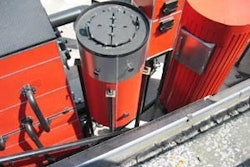Agriculture minister, Lord Rooker, told angry UK egg producers of government plans to bring in the European Union (EU) ban on conventional battery cages in 2012, irrespective of what other EU members decide to do. Following this shock announcement at annual Poultry and Egg Conference in November 2007, the industry has tried to convince government of the logistical and cost implications of replacing such a huge number of battery cages with enriched cages in time. UK industry would suffer the same fate as Germany and Austria, they say where early bans on battery cage egg production in advance of the EU deadline has simply sucked in imports of the very same eggs from other EU member states. UK producers doubt whether many southern and eastern European member states will impose the ban by 2012. Only 2% of Spain’s total egg production currently comes from non-caged hens.
UK consumers are reassured by the ‘Lion Mark’ stamped on high quality home-grown eggs from a range of layer management systems including battery cages. The public are still largely unaware of EU-inspired moves towards an enriched cage environment for laying hens. Instead, they are bombarded in the press and TV with more broadly based animal welfare issues, against any type of cage egg production and extolling perceived (although unproven) nutritional and health virtues of eggs from certified organic and free-range hens.
Plans for enriched cage production in the UK could become irrelevant following the 5 January 2008 announcement by three of the UK’s best-known supermarkets. They will be accelerating phasing out and banning of all cage eggs amid perceived escalation in the consumer backlash against cheap food on animal welfare. News first hit in Sunday Times under the headline ‘Stores to ban ‘cruel’ eggs from battery hens.’
Supermarket chains Sainsbury, Morrison and Co-op claim they will ban or phase out sale of eggs from caged hens, thus joining Marks & Spencer and Waitrose who have already removed cage eggs from their shelves. Within just two years, UK supermarkets could be selling only eggs laid by barn, free-range and organic (free range) hens. Sainsbury expects to end sales of all eggs from caged hens, currently accounting for 25% of its egg sales, by 2009. Co-op is expected to announce a similar move and Morrison said it planned to stop selling eggs from caged hens in its own brand by 2010.
Other UK supermarkets have already reacted to the announcement. Asda said it is ‘working hard’ to phase out use of eggs from caged hens, but has yet to set a deadline. Tesco said it is reducing shelf-space for eggs from caged hens. Both of these – the country’s largest supermarket chains – are expected to fall in line and announce a ban shortly.
Pressure builds for early ban of cage eggs
Pressure built up over Christmas 2007 from the mounting media campaign highlighting alleged deficiencies in bird welfare from so-called ‘factory farming’, i.e. intensively reared broilers and battery-caged hens, and its alleged tie to low cost and nutritionally inferior poultry products.
TV celebrity chefs including Jamie Oliver who promotes the Sainsbury’s supermarket chain featured strongly in the coverage. Channel 4 is currently running a series of food programmes featuring Oliver and another TV celebrity chef, Hugh Fearnley-Whittingstall. The latter is conducting a televised ‘experiment’ to compare different ways of farming chickens. Royal Society for the Prevention of Cruelty to Animals has placed national newspaper advertisements to create what looked like a concerted and coordinated campaign that the British poultry industry may find hard to match.
British supermarkets claim to be setting layers ‘free’ in response to consumer demand. In doing so, they could be springing a trap for domestic egg producers and the UK poultry industry in general. Local farming publications are carrying many reports from cage egg producers currently uncertain of their business future while they await concrete government decisions on replacing battery cages with enriched cages. The industry claims it is logistically and economically impossible to achieve this within the time stipulated by Lord Rooker, i.e. by 31 December 2011. UK supermarkets have greater control over food production and consumption than most other countries. Some cage egg producers may well decide to cut their losses, already exacerbated by spiralling feed costs and low egg prices, and get out.
In contrast, the UK free-range egg market is buoyant and growing. Nevertheless, local producers fear supermarket chains will be just as happy to sell free-range eggs imported from other countries. The domestic free-range egg supply problem was exacerbated in 2006 when the Department of Environment, Food and Rural Affairs uncovered a scam in which large numbers of cage eggs were found to have been imported from other EU countries and fraudulently stamped as UK-produced free-range eggs. At the time, supermarkets were also ‘accused’ of importing free-range eggs from France.
Withdrawal of battery eggs from shelves of all major UK supermarkets within two years would clearly aggravate this situation. It may be coincidental but a consumer survey recently released by EggSell – a free-range egg marketing co-operative in northern England – is claiming to show over 85% of UK consumers would rather buy foreign free-range eggs than UK battery-produced eggs.
European Union Laying Hen Directive
European Union Laying Hen Directive (1999/74/EC) was passed in 1999 and allowed producers a 12-year period to phase out use of ‘conventional’ battery cages. The Directive requires hens be provided with ‘enriched’ (‘furnished’) cages with strict specifications. These include a minimum area of 750cm2 per hen with at least 600cm2 of minimum height 45cm. In addition, birds must have access to a perch and a nest, an area with litter material and an appropriate claw-shortening device fitted to the cage.
The ban has been ‘incubating’ for years but universal implementation by 2012 is still thought unlikely due to objections by some EU countries in southern and eastern Europe, claiming inability to implement the ban so soon.
European Commission confirmed in a statement on 8 January 2008 that the European Directive banning the keeping of laying hens in battery cages will go ahead as planned from 2012.

















